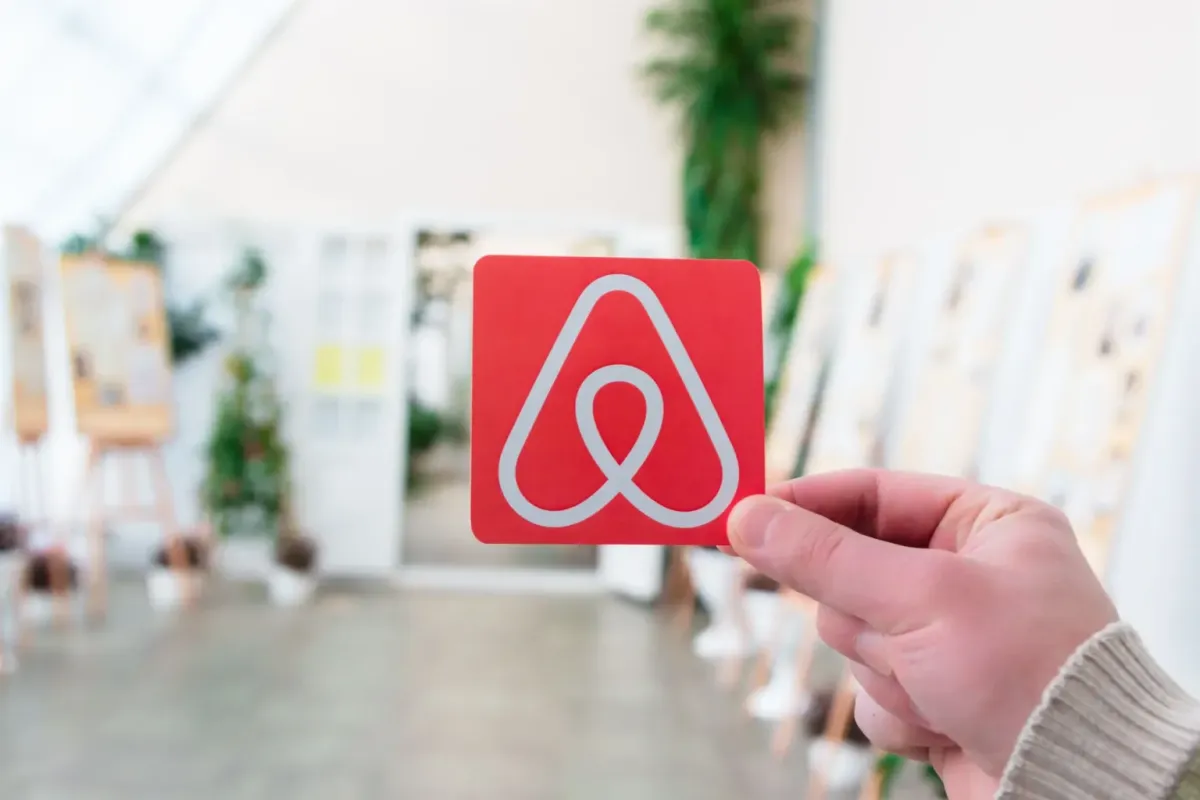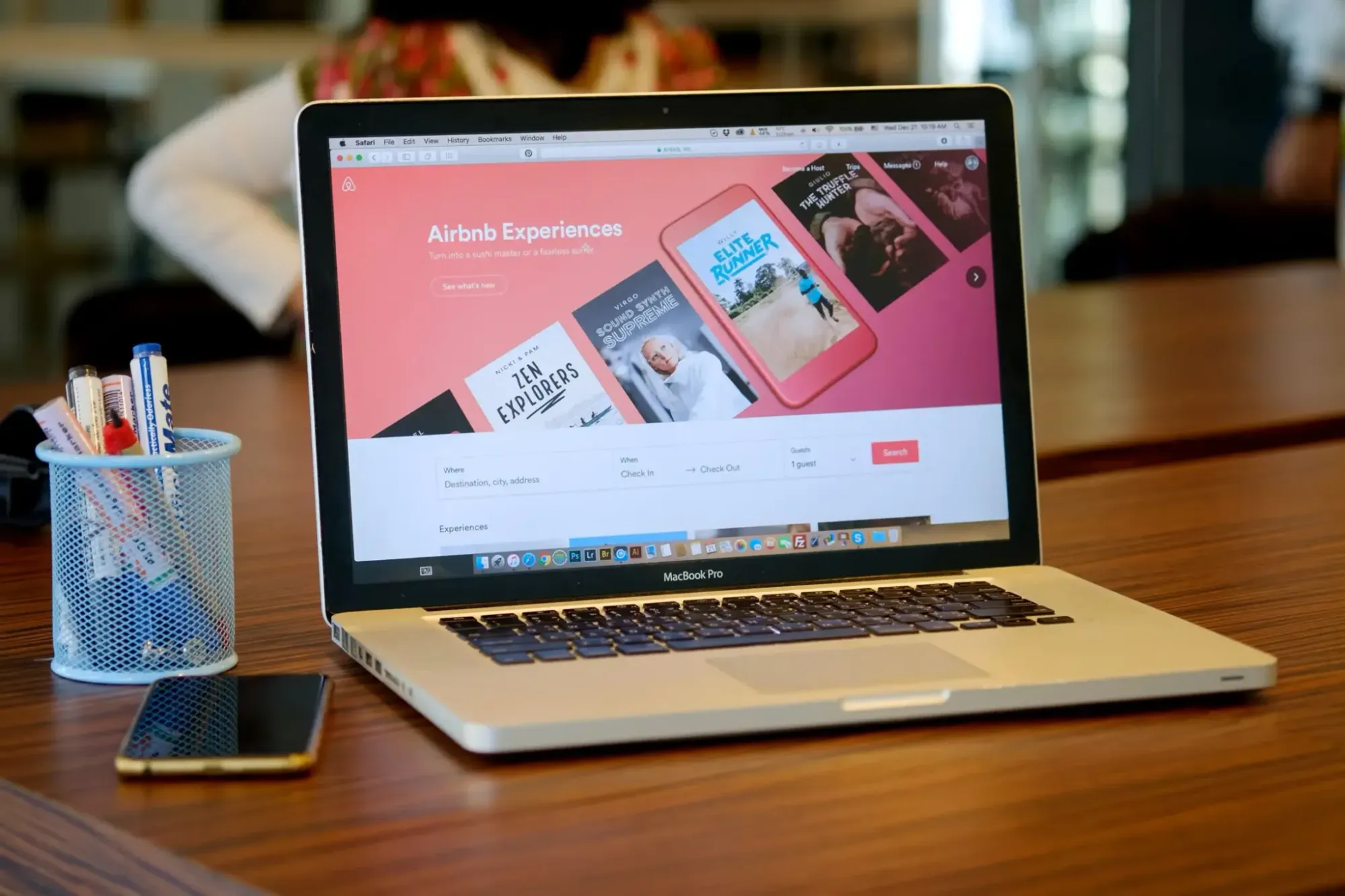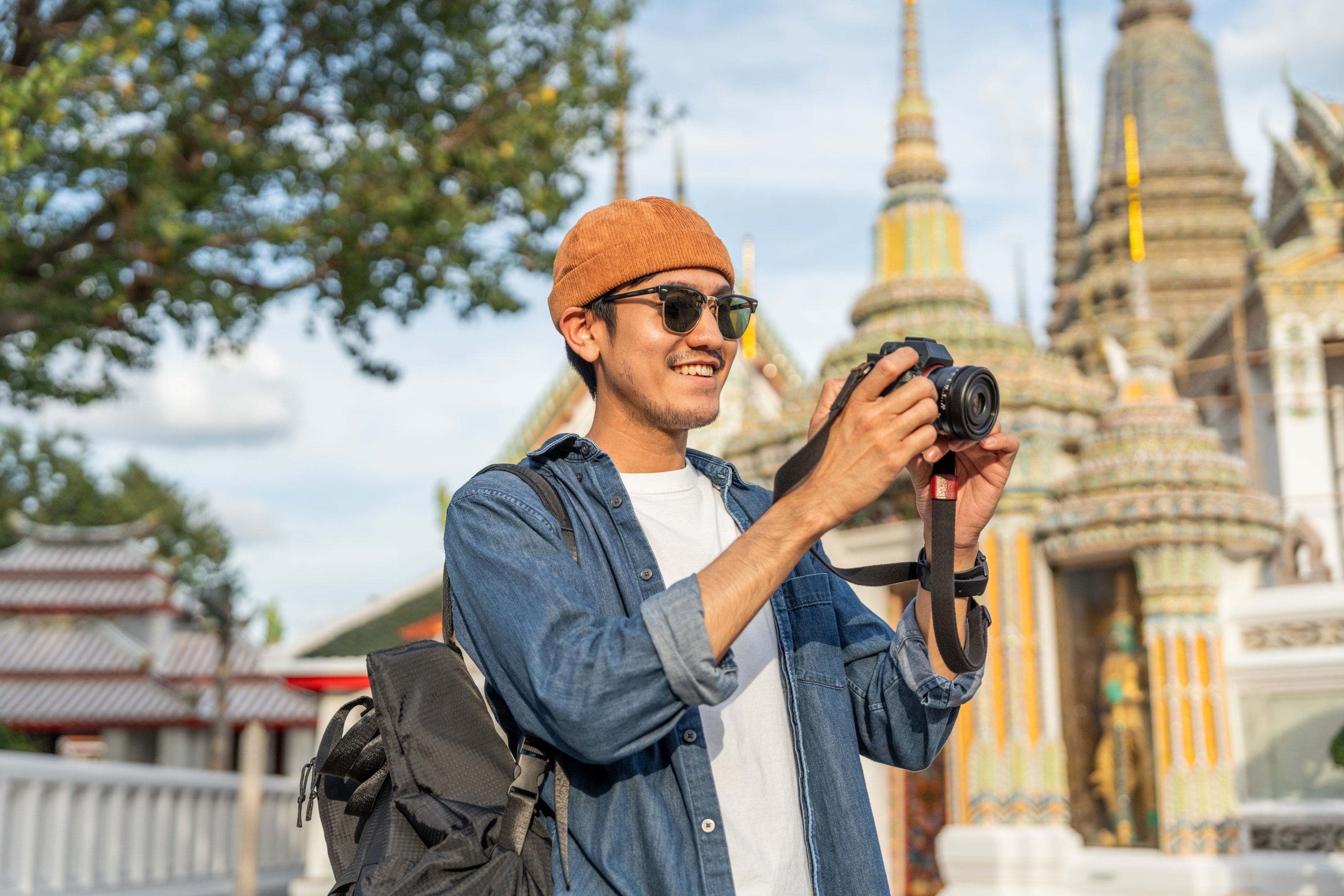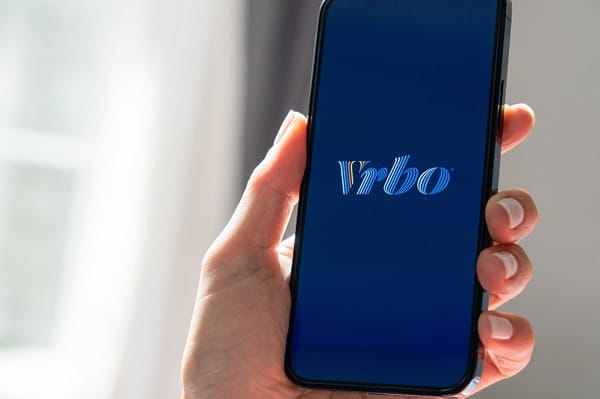A Look at Airbnb: Meaning, Offerings, and Impact

If you've tried booking accommodation at any point in the last 15 years, you have most definitely come across the name Airbnb. But have you ever wondered how it started? Where did the name come from? What is the Airbnb logo? How do Airbnb stays compare to traditional hotels? How big is it all really?
We can tell you. Let's get into Airbnb: meaning, the air bed story, and everything in between.
What is Airbnb?
In a nutshell, Airbnb is an online platform where hosts can rent out their property to guests for short-term stays. This could be a room in a larger property or an entire home.
What does Airbnb stand for? Airbnb stands for “Air Bed and Breakfast.” It’s a nod to the company’s humble beginnings as a start-up by the founders who wanted to capitalize on an accommodation shortage during a local conference in San Francisco by renting out air mattresses from their apartment.
Wondering about the logo? The Bélo represents Airbnb. It combines four simple symbols to represent people, place, love, and the letter ‘A’. It serves as a location icon, like a kind of little pin you would find on a map. It also represents belonging, a nod to the company’s mission to connect and foster community.
Airbnb is a peer-to-peer platform where hosts can connect with guests who want to rent their space. It allows hosts to list details about the property like location, size, price, and availability so guests can search and book stays that fit their needs.
In addition to accommodation, Airbnb is also known for “Experiences”, special activities designed by local hosts to enhance a stay or add a unique twist. These can be booked separately from the stay but are not mutually exclusive. We'll get more into that later.
What is the Sharing Economy?
Airbnb works based on the sharing economy, also known as the peer-to-peer economy or collaborative consumption, which is a socio-economic system built around the sharing of physical and intellectual resources. Put simply, it acts as a middleman. The company doesn’t own properties, but it provides the online marketplace.
It’s based on the idea of “access over ownership,” where people can rent or borrow assets owned by someone else. The sharing economy thrives on technology to facilitate exchanges and transactions between parties, often reducing costs and increasing convenience for users.
Hosts pay a small fee (around 3% of the booking), while guests cover a service fee, usually between 5% and 15%. These charges keep the platform running and fund services like secure payments and customer support.
Airbnb’s role in the global Sharing Economy
Airbnb has been a big part of the Sharing Economy, showing how peer-to-peer business models work. It’s a perfect example of the model. It’s a platform where people with spare rooms or properties (hosts) can rent them out to travellers (guests) looking for accommodation.
By doing this, Airbnb utilises underused assets (like a vacant apartment or unused vacation home), provides hosts with an income stream, and offers travellers unique, often cost-effective alternatives to traditional hotel accommodation.
The rise of Airbnb and the Sharing Economy means more efficient use of resources, extra income for hosts, and more choice for consumers. But it also raises concerns about issues like workers’ rights, safety, and impact on local communities.
The Airbnb Platform: How it Works
The Airbnb platform is pretty straightforward. People who have space to rent can list their property on the platform, providing details like location, size, price, availability, rules, and amenities. This makes them an Airbnb host. They can also upload photos and write a personal description to make their listing more attractive.
Airbnb hosts list their property, manage bookings, handle payments, and are charged fees while guests pay for their stay through Airbnb’s secure system, which includes service fees. This process from listing to booking is seamless, and Airbnb is a one-stop shop for short-term rental accommodation.
Once listed, these properties are visible to guests worldwide. Guests can search for properties based on location, travel dates, price range, property type, and specific amenities. Once a property is selected, guests can message the host directly through Airbnb’s messaging system to ask questions or clarify details.
To book a property, guests pay the listed price plus any additional fees (like cleaning fees or service fees) through Airbnb’s secure payment system. Airbnb holds the payment until 24 hours after check-in before releasing it to the host, so guests arrive at a property that meets their expectations.
Both hosts and guests can leave reviews after the stay, creating a community of trust and respect. The review system also plays a big part in the decision-making process for future bookings, as both parties are incentivised to behave well to maintain a good rating.
So the Airbnb platform facilitates transactions between hosts and guests, providing a seamless and personal experience for short-term rentals.
Airbnb vs. Hotels
Airbnb has changed the way people think about travel. Hotels used to be the default choice, offering standardized rooms, set services, and predictable comfort. Airbnb introduced something different: more space, lower prices, and the chance to stay somewhere unique. Guests can cook their own meals, do laundry, or live in a neighborhood instead of a tourist district.
It hasn't completely tanked the hotel industry, though. Hotels still have their strengths, like 24/7 staff, daily cleaning, and loyalty rewards, but Airbnb gives travelers more options. For budget-conscious guests, families, or those wanting a local touch, Airbnb is often the better fit.

A Deep Dive into the Platform’s Offerings
Airbnb’s vast range of accommodation options has changed the travel and hospitality industry, offering travellers many unique and personal choices. From the early days of renting out a spare room, Airbnb has evolved to include the option to rent out an entire house, for larger groups or families who want privacy and comfort.
This shows the platform’s flexibility but also the importance of complying with local laws and regulations when listing an entire house. Unlike the high costs and limited availability of hotel rooms, Airbnb options are more affordable and convenient. The range of Airbnb properties, from single rooms to entire homes, caters to all types of traveller needs, unlike the traditional hotel room options that used to dominate the market.
Airbnb’s acquisition of Luxury Retreats for $300 million and the introduction of Airbnb Luxe have also strengthened its presence in the luxury home space, offering travellers luxurious options that redefine luxury travel. Here’s a breakdown of their different types of listings:
Different Types of Listings
- Whole Homes: These are entire properties that guests can rent, providing them with complete privacy and full use of all spaces, such as living rooms, bedrooms, bathrooms, and kitchens. These range from apartments and houses to lofts and villas.
- Private Rooms: Guests rent a private room within a host’s property, usually sharing common spaces like the kitchen and living room with the host or other guests.
- Shared Rooms: Accommodations where guests share the entire space, including bedrooms, with others. A budget-friendly option for solo or flexible travelers.
- Unique Stays: Unusual and extraordinary accommodations like treehouses, yurts, boats, and even castles for a one-of-a-kind travel experience.
- Airbnb Plus: A selection of high-quality, well-equipped homes with great hosts and attention to detail. Each Airbnb Plus home is inspected and verified in person for comfort, consistency, and design.
- Airbnb Luxe: Airbnb’s luxury line of rentals. Luxe listings are high-end properties with top-tier amenities and services, often including a dedicated trip designer to coordinate check-in, housekeeping, and other personalized services.
Airbnb Experiences
Airbnb Experiences are activities designed and hosted by locals that go beyond typical tours or workshops. They allow guests to get inside the world of each host and understand the place they’re visiting.
Airbnb Experiences allow travelers to experience local customs and culture through the eyes of those who live there. These can be anything from a cooking class with a local chef, a mural tour with a street artist, or a hike through hidden trails with a local guide. These unique and personalized experiences enable travelers to form real connections and create unforgettable memories.
Airbnb Online Experiences are virtual activities that allow guests to travel without leaving their homes. Hosted by locals and experts around the world, and can be joined via a video conferencing platform.
With the COVID-19 pandemic and the travel restrictions that followed, Airbnb quickly adapted and introduced Online Experiences. It allowed hosts to continue earning income and provided an enjoyable and socially distant activity for guests.
Online Experiences took off in popularity, featuring a wide range of activities from virtual tours and online classes to interactive concerts, proving that travel can be reimagined even in the face of a global crisis.

Airbnb and Tourism
Airbnb can boost local tourism by offering unique accommodations and experiences that attract travelers to less-touristed areas, spreading the economic benefits of tourism more widely. Local hosts also often recommend local businesses to guests, supporting local restaurants, shops, and attractions.
Impact on the Vacation Rental Space
Airbnb allows hosts to rent out their private homes, whether it be a whole house, a single room, or unique accommodations like treehouses or yachts. This means guests can have a more personal and local experience. In addition, the range of price points, locations, and types of accommodations on Airbnb is much broader than what’s available through traditional channels.
Airbnb has introduced more competition in the hospitality industry, especially in popular tourist destinations. This means more availability and often more affordable options for travelers.
But the rise of Airbnb has also been linked to higher property prices and fewer long-term rentals in some cities, as property owners can sometimes earn more from short-term Airbnb rentals.
Regulatory and Legal Challenges for Airbnb
All over the world, Airbnb has had legal problems with things like zoning laws, hotel rules, a lack of housing, and property rights. Laws weren't made with platforms like Airbnb in mind, so these problems often happen.
These legal problems can affect hosts, who could get fined or go to court if they break local rules or laws. Hosts need to know the rules in their area and follow them.
A lot of the rules that govern platforms like Airbnb are set by the government. This could mean making new rules for short-term rentals, following the ones that are already in place, or talking with Airbnb itself.
These rules could make it harder for Airbnb to run its business. Limits on how many days a property can be rented out or the need for hosts to get a license are two examples of things that can change the number of listings on the platform. But rules that are clear and fair can also help Airbnb run more smoothly and sustainably in the long term.

Wrapping Up
An air mattress in a San Francisco apartment was the start of Airbnb. It grew into a global brand that has changed the way people travel. It made a platform where regular people could become hosts, and travelers could find unique, flexible, and often cheaper alternatives to hotels by combining technology with the sharing economy.
Airbnb is more than just a place to stay these days. Experiences help people learn about other cultures, vacation rentals range from cheap to fancy, and the site promotes tourism in areas that might not get as much attention otherwise. It also has problems with rules, housing markets, and finding a balance between responsibility and growth.
When it comes to traveling around the world, Airbnb has had a big effect. Some see it as a threat to the hotel business, a leader in the sharing economy, or just an easy way to plan your next trip. Airbnb has changed the way people think about where and how they stay when they're not at home.




![Complete Vacation Rental Email Marketing for Hosts [+ Top Tools]](/content/images/size/w600/2026/01/email-marketing.jpg)
